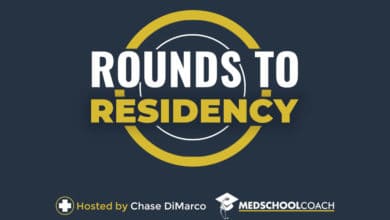Samee Hameed, a fourth-year medical student, talks about health disparities, racial inequality in medicine, and how the future generation of medics can tackle implicit bias and institutional racism.
- [02:01] Samee’s Journey to Dual Residency
- [03:39] How Medical Students are Changing the World of Medicine
- [06:40] How to Have an Open Discussion with Members of The LGBTQ Community
- [09:10] Health Disparities Within Medicine
- [12:45] Implicit Biases Plaguing the Medical Space
- [15:50] Why Change Needs to Start with Individual Medics
- [17:20] Creating a Platform for People to Participate in a Conversation
Chase DiMarco talks to Samee Hameed, a fourth-year medical student at the University of Texas Medical Branch. They talk about health disparities, racial inequality in medicine, and how the future generation of medics can tackle implicit bias and institutional racism.
Samee’s Journey into Dual Residency
Dual residency is usually very competitive, so the fact that Samee made it that far is actually quite impressive. Samee was motivated by his passion for global health, where he intends to work in low resource settings in the future. He believes that treating everybody, no matter the illness, is an invaluable skill that will propel him to his dream of becoming an oncologist.
How Medical Students are Changing the World of Medicine for The Better
In the past medical students were primarily interested in getting an education and nothing more. However, the past couple of years have witnessed more and more students learning soft skills to better doctor-patient relationships. The group, Allies In Medicine, has been at the forefront in equipping medical students with skills that facilitate open conversations between patients and doctors, especially patients from diverse backgrounds. Samee believes that such missions are what will inevitably make the medical world a better place.
How to Have Open Discussions with Members of The LGBTQ Community
As a medic, it’s extremely important to connect with your patient the first few minutes of an appointment. Nevertheless, that does not mean that you should constantly be on your toes, afraid to make a mistake. Once you make a mistake, such as using the wrong noun when addressing your patient, you need to accept your mistake and make sure you don’t commit a similar mistake in the future. Medics often have some bias towards everybody. For this reason, it’s up to you to take the initiative and acknowledge that our community consists of people from different backgrounds, and that includes people from the LGBTQ community.
Health Disparities Within Medicine
The U.S might boast some of the most sophisticated medical technologies in the world today, unfortunately not every citizen has access to these technologies. This is mostly because our medical system is based on how much wealth a person has. Thus, people who can not afford high-quality healthcare experience worse outcomes. As medical practitioners, the only way we can arrive at a solution is by tackling the problem from its root source.
Implicit Biases Plaguing the Medical Space
Samee believes that implicit biases have been plaguing the medical world for far too long and that it’s time we as medics did something about that. The first step would be to acknowledge that we have a problem and have open conversations with the affected parties. Furthermore, Samee feels like the incoming generation of medics will be open to having conversations about implicit biases and eventually come up with solutions. However, this can only be done if we start making changes from an individual perspective before tackling the issue as a society.
Why Change Needs to Start With Individuals
As earlier mentioned, change will only occur if we all decide to make a difference from a personal perspective. To do that, medics need to change their attitudes towards marginalized communities and have conversations with them. In doing so, we not only include them in the conversation, but we also include them in the solutions. The medical world is always in a state of change; how you approach a situation today might not necessarily work the following day. So, it’s up to us as medics and medical students to never stop learning new techniques to better our patients lives.
Sign up for a Free Coaching session with Chase DiMarco, sponsored by Prospective Doctor! You can also join the Med Mnemonist Mastermind FB Group today and learn more about study methods, memory techniques, and MORE! Do check out Read This Before Medical School. Like our FreeMedEd Facebook page and find our Medical Micro Course, Blog posts, and Podcasts at FreeMedEd.org! Feel free to Email any Questions or Comments.
